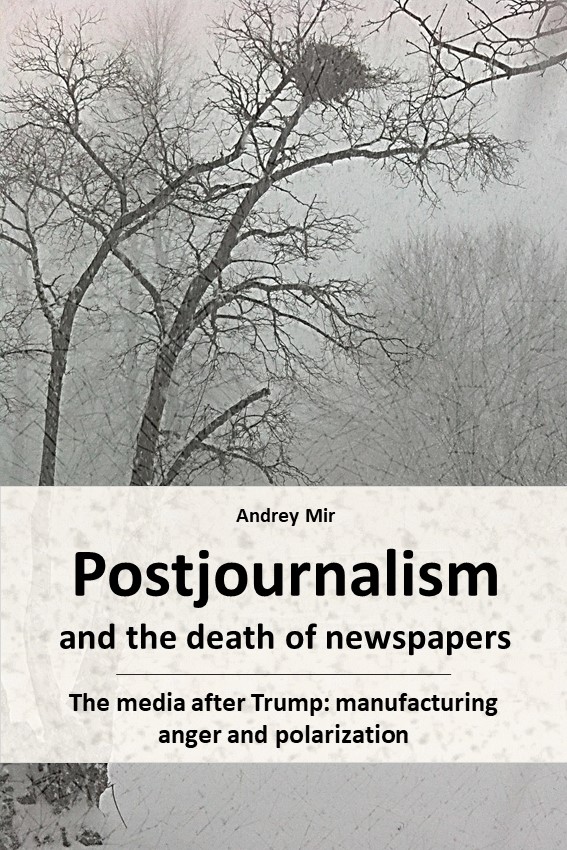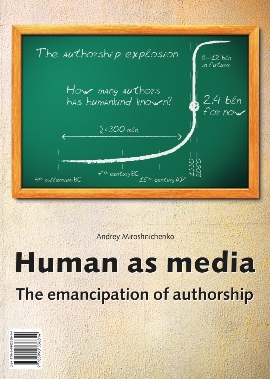As was the case with McLuhan, academia struggles to appreciate media ecology. Traditional communication departments divide the field between the administrative approach and cultural criticism. The administrative approach (rooted in the Chicago and Columbia schools) focuses on human skills and reactions in media production and consumption. The critical approach (rooted in the Frankfurt and Birmingham schools) focuses on class struggle and, more recently, identity struggle, for which media serve as a conduit.
Media ecology can do both but does not bother. Instead of looking at what people do with media, media ecology studies what media do to people. While others study something else in relation to media – either human skills and reactions or the power struggle – media ecology studies media themselves, because “the medium is the message.” Basically, media ecology is the true media study. It’s no surprise that media ecology is an anti-environment in academia. If you are into media ecology, you often need to disguise your references and apparatus.
To map the territory of the forbidden, the list of references forbidden for reading and quoting has long been overdue. The list includes books as well as some essential essays and articles. The list is a work in progress: send your suggestions in the comments or elsewhere – they will be thoroughly disregarded and forbidden.
The list was not approved by the Media Ecology Association and itself will soon likely be forbidden by its Central Committee. Like, share, and repost before it happens.
The Media Ecology Index Librorum Prohibitorum
Albrecht, Robert (2004). Mediating the muse: A communications approach to music, media and cultural change. Link.
Anton, Corey, and Strate, Lance (2012). Korzybski and… Link.
Anton, Corey. (2011). Communication uncovered: general semantics and media ecology. Link.
Bateson, Gregory. (1972). Steps to an ecology of mind: Collected essays in anthropology, psychiatry, evolution and epistemology. Link.
Bateson, Gregory. (1979). Mind and nature: A necessary unity (advances in systems theory, complexity, and the human sciences). Link.
Cali, Dennis D. (2017). Mapping media ecology: Introduction to the field. Link.
Carey, James W. (1989). Technology and ideology: The case of the telegraph. Chapter 8 in Communication as culture. Link.
Carpenter, Edmund. (1973). Oh, what a blow that phantom gave me! Link.
Carr, Nicholas. (2011). The shallows: What the internet is doing to our brains. Link.
Cogan, Brian, and Gencarelli, Thom. (Eds.). (2015). Baby boomers and popular culture. Link.
Deleuze, Gilles, and Guattari, Felix (1982). A thousand plateaus: Capitalism and schizophrenia. Link.
Eisenstein, Elizabeth L. (1979). The printing press as an agent of change. Communications and cultural transformations in early-modern Europe. Link.
Ellul, Jacques. (1964). The technological society. Link.
Ellul, Jacques. (1965). Propaganda: The formation of men’s attitudes. Link.
Fallon, Peter K. (2009). The metaphysics of media: Toward an end of postmodern cynicism and the construction of a virtuous reality. Link.
Fallon, Peter K. (2022). Propaganda 2.1. Understanding Propaganda in the Digital Age. Link.
Gibson, James J. (1979). The Ecological Approach to Visual Perception. Link.
Goody, Jack. (1987). The interface between the written and the oral. (Studies in literacy, the family, culture and the state) Link.
Goody, Jack. (1977). The domestication of the savage mind. (Themes in the social sciences). Link.
Goody, Jack. (1986). The logic of writing and the organization of society. (Studies in literacy, the family, culture and the state.) Link.
Goody, Jack. (2000). The power of the written tradition. Link.
Granata, Paolo. (2021). Introduction to media ecology. Thinkers, schools of thought, key concepts. Link.
Guattari, Felix (2000) The three ecologies. Link.
Gurri, Martin. (2018). The revolt of the public and the crisis of authority in the new millennium. Link.
Havelock, Eric A. (1963). Preface to Plato. (History of the Greek mind.) Link.
Havelock, Eric A. (1986). The Muse learns to write. Reflections on orality and literacy from antiquity to the present. Link.
Innis, Harold. (1950). Empire and communications (Critical media studies: institutions, politics, and culture). Link.
Innis, Harold. (1951). Bias of Communication. Link.
Jarvis, Jeff. (2023). The Gutenberg Parenthesis: The age of print and its lessons for the age of the internet. Link.
Jenkins, Henry. (2006). Convergence culture. Where old and new media collide. Link.
Kittler, Friedrich. (1986). Gramophone, film, typewriter. Link.
Korzybski, Alfred. (1921). Manhood of humanity: The science and art of human engineering. Link.
Kurzweil, Ray. (2005). The Singularity is near: When humans transcend biology. Link.
Levinson, Paul. (1999). Digital McLuhan: A guide to the information millennium. Link.
Levinson, Paul. (2013). New new media. Link.
Levinson, Paul. (2017). Human replay: A theory of the evolution of media. Link.
Lippmann, Walter. (1922). Public opinion. Link.
Logan, Robert K. (2004 [1986]). The alphabet effect: A media ecology understanding of the making of Western civilization. The 2nd edition. Link.
Logan, Robert K. (2010). Understanding New Media: Extending Marshall McLuhan. Link.
Logan, Robert K. (2013). McLuhan misunderstood: Setting the record straight. Link.
Logan, Robert K. (2000). The sixth language: Learning a living in the Internet age. Link.
McLuhan, Eric, and Zingrone, Frank (Eds.). (2005). The essential McLuhan. Link.
McLuhan, Eric. (2000). The Fordham experiment. Proceedings of the Media Ecology Association, 1, 23–27. Link.
McLuhan, Marshall, and Fiore, Quentin. (1967). The medium is the massage: An inventory of effects. Link.
McLuhan, Marshall, and Fiore, Quentin. (1968). War & peace in the global village. Link.
McLuhan, Marshall, and McLuhan, Eric. (1988). Laws of media: The new science. Link.
McLuhan, Marshall. (1951). The mechanical bride: Folklore of industrial man. Link.
McLuhan, Marshall. (1962). The Gutenberg Galaxy. The making of typographic man. Link.
McLuhan, Marshall. (1964). Understanding Media. The extensions of man. Link.
McLuhan, Marshall. (1967). McLuhan Hot and Cool: A primer for the understanding of McLuhan. Stearn, Gerald E. (Ed.). Link.
McLuhan, Marshall. (1969, March). The Playboy Interview. Link.
McLuhan, Marshall. (1974). At the moment of Sputnik the planet became a global theater in which there are no spectators but only actors. Journal of Communication, March 1974, Volume 24, Issue 1, pp. 48-58. Link.
McLuhan, Marshall. (1970). Living in an acoustic world. A lecture at the University of South Florida. In Marshall McLuhan Speaks, Special Collection. Link.
McLuhan, Marshall. (1987). The letters of Marshall McLuhan. (M. Molinaro, C. McLuhan, and W. Toye, Eds.) Link.
McLuhan, Marshall. (2003). Understanding me. (S. McLuhan and D. Staines, Eds.) Link.
Meyrowitz, Joshua. (1985). No sense of place: The impact of electronic media on social behavior. Link.
Mir, Andrey. (2020). Postjournalism and the death of newspapers. The media after Trump: manufacturing anger and polarization. Link.
Mir, Andrey. (2024). Digital future in the rearview mirror: Jaspers’ Axial Age and Logan’s Alphabet Effect. Link.
Miroshnichenko, Andrey. (2014). Human as media. The emancipation of authorship. Link.
Miroshnichenko, Andrey. (2021). Media and responsibility for their effects: instrumental vs. environmental views. Laws, 10, no. 2, p. 48. Link.
Mumford, Lewis. (1967). The myth of the machine: I. Technics and human development. Link.
Mumford, Lewis. (1970). The myth of the machine: II. The pentagon of power. Link.
Norman, Don. (2013). The design of everyday things. Link.
Nystrom, Christine L. (2021). The genes of culture: Towards a theory of symbols, meaning, and media. Link.
Ong, Walter J. (1977). Interfaces of the word: Studies in the evolution of consciousness and culture. Link.
Ong, Walter J. (1982). Orality and literacy. The technologizing of the word. Link.
Ong, Walter J. (2002). An Ong reader. Challenges for further inquiry. (T. J. Farrell & P. A. Soukup, Eds.) Link.
Parikka, Jussi. (2012). What is media archaeology? Link.
Pariser, Eli. (2011). The filter bubble: How the new personalized web is changing what we read and how we think. Link.
Parry, Milman. (1971). The making of Homeric verse: The collected papers of Milman Parry. Link.
Peters, John Durham. (2017). “You mean my whole fallacy is wrong”: On technological determinism. Representations, Fall, No. 140, Special Issue: Fallacies, pp. 10–26. Link.
Postman, Neil. (1970). “The reformed English curriculum.” In: High School 1980: The Shape of the Future in American Secondary Education. (Alvin C. Eurich, Ed.). Link.
Postman, Neil. (1985). Amusing ourselves to death: Public discourse in the age of show business. Link.
Postman, Neil. (1992). Technopoly: The surrender of culture to technology. Link.
Postman, Neil. (2000). The humanism of media ecology. Keynote address at the inaugural Media Ecology Association Convention. Fordham University, New York, June 16–17, 2000. Link.
Rushkoff, Douglas. (2010). Media virus! Hidden agendas in popular culture. Link.
Rushkoff, Douglas. (2013). Present shock: When everything happens now. Link.
Rushkoff, Douglas. (2019). Team human. Link.
Scolari, Carlos A. (2023). On the evolution of media. Understanding media change. Link.
Shirky, Clay. (2010). Cognitive surplus: Creativity and generosity in a connected age. Link.
Shlain, Leonard. (1998). The alphabet versus the goddess: The conflict between word and image Link.
Strate, Lance. (1999). Understanding MEA. President’s message. In Medias Res, Volume 1, Number 1, Inaugural Issue, October. Link.
Strate, Lance. (2006). Echoes and reflections: On media ecology as a field of study. Link.
Strate, Lance. (2008). Studying media as media: McLuhan and the media ecology approach. Media Tropes, 1, 127–142. Link.
Strate, Lance. (2011). On the binding biases of time and other essays on general semantics and media ecology. Link.
Strate, Lance. (2014). Amazing ourselves to death: Neil Postman’s brave new world revisited. Link.
Strate, Lance. (2017). Media ecology: An approach to understanding the human condition. Link.
Strate, Lance. (2020). Ethics and the study of media as environments. Explorations in Media Ecology, Volume 19, Number 1, 1 March 2020, pp. 5–22(18). Link.
Taffel, Sy. (2019). Digital media ecologies. Entanglements of content, code and hardware. Link.
Turkle, Sherry. (2012). Alone together. Link.
White, Lynn T., Jr. (1962). Medieval technology and social change. Link.
See also books by Andrey Mir:
- Digital Future in the Rearview Mirror: Jaspers’ Axial Age and Logan’s Alphabet Effect (2024)
- Postjournalism and the death of newspapers. The media after Trump: manufacturing anger and polarization (2020)
- Human as media. The emancipation of authorship (2014)



Categories: Marshall McLuhan, Media ecology, Media literacy
McLuhan, Logan, Mir and others “forbidden references for reading and quoting’. This is surreal. Is this a joke? Have I missed something?? Please do explain 🤯